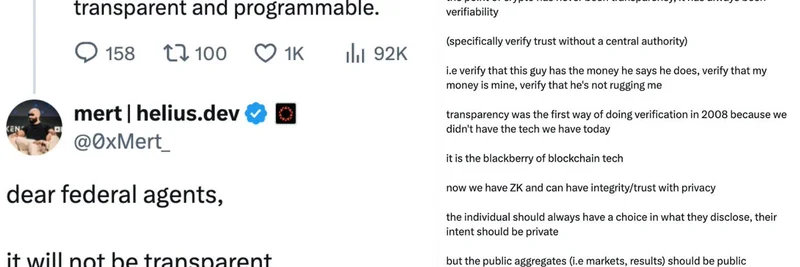In the ever-evolving world of cryptocurrency, a recent tweet from Mert, the developer behind Helius.dev, has sparked a lively discussion. Shared by DegenerateNews on X (formerly Twitter), Mert challenges the common narrative around crypto's purpose. He argues that the real heart of crypto isn't transparency but verifiability—especially in a time when tech like zero-knowledge proofs (ZK) allows for trust without sacrificing privacy.
Unpacking Mert's Take on Crypto's Foundations
Mert's response was aimed at a post from Robinhood, which proclaimed, "The future of finance will be both transparent and programmable." But according to Mert, this misses the mark. He calls it a "psyop" (short for psychological operation, a term often used in crypto circles for misleading narratives) pushed by early crypto adopters to appease regulators.
Instead, Mert emphasizes verifiability: the ability to confirm facts without needing a central authority. Think of it like this—verifiability lets you check if someone has the funds they claim, ensure your assets are truly yours, or spot a potential "rug pull" (when project creators suddenly pull out funds, leaving investors high and dry) without exposing every detail of everyone's transactions.
He points out that transparency was just the initial method back in 2008 when Bitcoin launched, because the tech wasn't advanced enough for better options. It's like comparing it to the Blackberry smartphone—functional for its time but outdated now. With modern advancements like ZK proofs, which let you prove something is true without revealing the underlying data, crypto can offer integrity and trust alongside privacy.
Privacy vs. Public Aggregates: Where to Draw the Line
Mert makes a clear distinction: individuals should control what they disclose, keeping their intentions private. But public aggregates—like market data or overall results—should remain open for everyone. This balance is crucial in the meme token space, where wild speculation and community-driven hype often lead to volatile trades. For instance, in meme coins like those on Solana (where Helius.dev focuses), verifiability ensures fair launches and prevents scams without forcing every trader's wallet to be an open book.
This perspective is especially relevant as regulators, or "federal agents" as Mert humorously addresses them, ramp up scrutiny. His cheeky sign-off, "dear federal agents, it will not be transparent, shalom," underscores a defiant push for user privacy in blockchain tech.
Implications for Meme Tokens and Blockchain Practitioners
For those diving into meme tokens, this shift toward verifiability with privacy tools like ZK could be a game-changer. Meme coins thrive on anonymity and fun, but they've been plagued by rugs and insider trading. Tools that verify without revealing—like proving a dev's holdings without showing their full wallet—could build more trust in communities.
If you're building or trading in the meme ecosystem, keep an eye on projects integrating ZK tech. It aligns with the decentralized ethos, reducing reliance on trusted third parties while protecting against bad actors. As Mert notes, don't confuse individual privacy with public transparency—the former empowers users, the latter ensures the system's health.
Check out the original thread on X for more reactions, including thoughts on privacy-focused blockchains and the decentralized fight against fiat systems. In a world where crypto is maturing, verifiability might just be the key to sustainable growth without losing its rebellious spirit.




